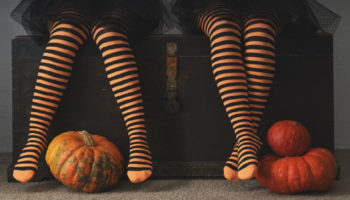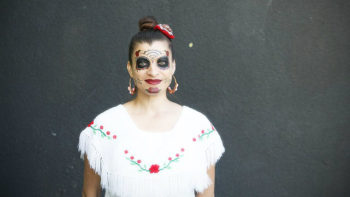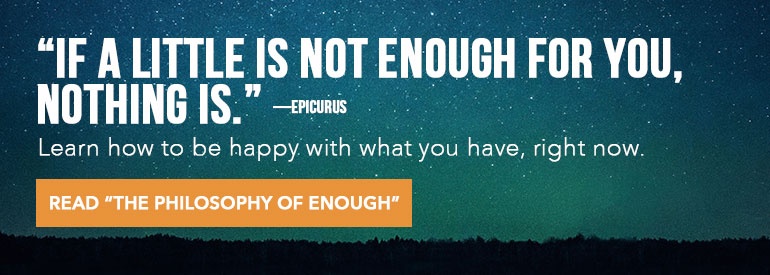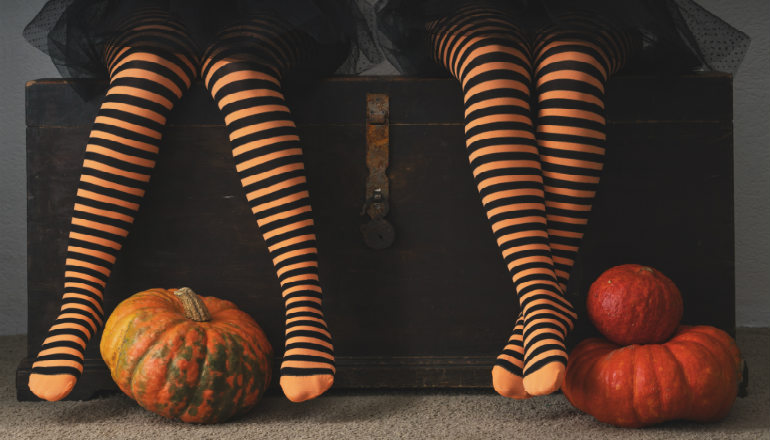 Reading Time: 7 minutes
Reading Time: 7 minutesIn the past, I always put off assembling a Halloween costume until the eleventh hour, at which point I cobble something together from my closet, supplemented by piddly remains from the local drugstore. I’d make this half-hearted attempt and then find myself comparing my costume to others:
- “His must have taken weeks to make.”
- “Hers is so clever.”
- “That one is way better than mine.”
I’d beat myself up for being so lame-o. Looking back, what remains in my Halloween memories is more “trick” than “treat.” Comparing did not inspire me to become more prepared or put more effort into the next year’s costume. In fact, I dreaded that time of year even more. And comparison certainly did not inspire me to have fun.
This cycle of shame lasted until a friend said something that changed everything — something I’m going to now share with you.

The 1 Word That Helped Me Stop Comparing Myself
It was Halloween in San Francisco (where costumes are of Burning Man proportion). I grabbed a dress from my closet, borrowed a wimpy wig, made an aluminum-foil tiara and a sash from cash register tape. Ugh.
Then, my friend showed up. Whoa. Let’s just say there was a lot going on. But, honestly, a theme didn’t jump out. So, I asked, “What are you?”
With one hundred percent, unapologetic confidence my friend replied, “This.”
No need to promote or defend. Simply, “This.”
The gift of that one word was like winning the emotional lottery. “Really,” I said. “This? You can say that?”
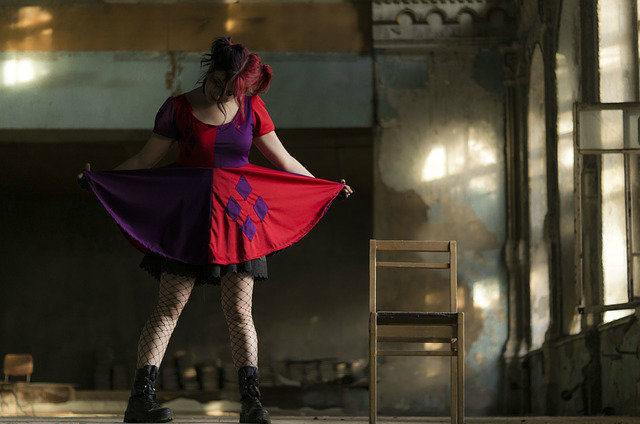
That night, having adopted my friend’s “this” mantra, I noticed the wide range of costumes and loved everyone’s place in the spectrum, including my own. My levity was palpable. Energy previously used to compare, judge, and shame (the worst “tricks”) was spent in celebration of the whole experience. I had a place among the crowd. Halloween and the whole costume experience now truly felt like a “treat.”
More importantly, this experience opened the door to becoming aware of other situations where I unconsciously compared myself to others:
- During a run, yoga class, or dance class.
- When meeting a friend-of-a-friend for the first time.
- While on a retreat with “like-minded” people.
- When attending concerts and people-filled events.
- While looking at social media.
The Science of Comparing
It would be great to declare, “I no longer compare.” But, truth be told, we couldn’t function as human beings without comparison. Everything we learn relies on this cerebral mechanism. David A. Sousa’s book, How the Brain Learns, explains that our brains store information by similarity, but retrieve it by difference:
- New information is split and stored by attribute (color, shape, texture, etc.).
- Sets of neurons form networks containing similar characteristics or associations.
- Information is retrieved from long-term memory by identifying how something is different from the other pieces in the network.
- The brain compares the critical attributes that separate one thing from the others.
This process is at the core of our survival and our ingenuity. Without it, we wouldn’t recognize a friend in a crowd. It enables us to establish norms, adapt to new cultures, and reconcile our own abilities.
But, like all thought processes, it’s a slippery slope. When we experience a negative comparison, the brain’s amygdala encodes and stores the emotion as well. So, every time we recall the event, we experience the negative emotion again. Over time, this affects our self-concept and can undermine our experiences.
A Quick Breakdown of Social Comparison Theory
In my personal analysis, I realized my comparisons were in areas relevant to my identity. I made comparisons during Halloween because I consider myself to be creative. I compare myself to others in arenas where I want to thrive. This tendency is supported and explained in the work done by Abraham Tesser who established the Self-Evaluation Maintenance Model.
This model is based on a few assumptions:
- People want to maintain a positive self-evaluation.
- People evaluate themselves partially based on the accomplishments of those around them, particularly those to whom they are close.
- If what is being evaluated is highly relevant, the success of somebody else creates a comparison that decreases our self-evaluation or self-concept.
- If the relevance is low, somebody else’s success causes us to reflect, increasing our self-esteem.
According to a Psychology Today article, psychologists divide social comparisons into two categories — downward and upward. Downward comparison involves comparing yourself to someone you perceive as worse off than yourself. Upward comparison is between you and someone perceived as better off. We tend to do this in arenas that matter most to us. Both types of comparison have their purposes and pitfalls.
- Downward comparison can make us feel better: “At least I’m not like that.” However, it’s a fragile boost to our self-concept and can cause feelings of entitlement. Focusing on others’ misfortune can generate pity that strips our perception of the other person’s agency and positive attributes, making “them” one-dimensional. It can actually diminish empathy.
- Upward comparison can motivate and inspire us to meet goals or allow us to bask in the glory by association. On the flip side, it can foster envy and low self-concept. It causes a biased perception by assuming others have it all, not recognizing the full range of vulnerability that exists in each of us.
Here’s how you can make the most of our natural instinct to create downward and upward comparisons:
- When comparing to the less fortunate: acknowledge your own vulnerability and range of positive and negative traits, talents, and experiences. Relinquish your status as judge. Throw compassion to others and yourself. We’re all doing the best we can with what we have.
- When comparing to the more fortunate: celebrate others while recognizing what makes you uniquely awesome. Stay true to your path. Don’t forget that what you see on the outside is never the whole story.

So, How Do We Handle Critics? (Both Others and Ourselves)
Nowadays, it seems the outer critic is tougher than ever. The bar has been raised, whether it’s the GPA needed to get into college or the number of ultra-marathons completed to be a “real” runner. Competition plays a major role in every corner of our lives.
But what if we used our minds and hearts to develop win-win scenarios? There don’t have to be losers to have winners. The world is large enough to accommodate us all. We can keep to our own authentic path and enjoy the journey without tripping someone else (or ourselves) along the way.
We are each a unique blip on the human spectrum and we can’t truly draw full comparisons: DNA reveals our inherent diversity; the term “old” is re-calibrated as we stay healthier longer; social norms that were once accepted are being called out. Comparison can be a useful tool. It sheds light on what we value and where we feel most vulnerable. But, if allowed to rule, comparing can undermine our success and fulfillment.
Knowing how you use comparison is one step to living with intention. Go inward and listen to your heart. It may have been reduced to a whisper, so listen closely and intently. Sit quietly and breathe. Dismiss the messages in your head for a few minutes. Be with yourself and accept every bit. Feel your own vulnerability and love yourself for it. That vulnerability is what connects you to all others. Nobody escapes that feeling, even the critics.
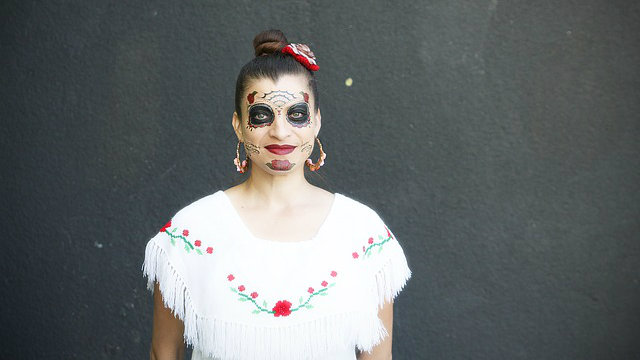
Say to yourself, “There is enough space in the world for me to be exactly who I am and for others to be exactly who they are.” Then, keep a lookout for the critics. Notice where they surface and if what they are saying is helpful or hurtful.
World famous researcher of vulnerability, Brené Brown, says in her video from the 99U conference, Why Critics Aren’t The Ones Who Count, “When we walk into the arena with anxiety, comparing, and fear, we shut ourselves off from creativity, love, and belonging. Comparison is always there and it’s a nightmare. We care what people think; we want to connect and be liked.” She advises not to lock critics out, though — including our inner critic.
Instead say, “I see and hear you, but I’m going to show up and do this anyway.
“This’ Is What Helped Me Stop Comparing Myself
So, are you ready to take on a “this” attitude like me this Halloween? If you think a “this” attitude nurtures laziness or mediocrity, consider it might be time to try on a new perspective. Ask yourself: do you hope to “fit in” or do you want to “belong”?
- “Fitting in” suggests doing whatever it takes for others to accept you.
- “Belonging” has others embrace you for being authentic, regardless of whether authentic-you “fits.”
This Halloween, and all the following, step out as your most authentic self. Catch those moments when your mind compares (because it will). Feel the vulnerability in and around that moment. Celebrate the humanity and diversity you’re observing.
And if your inner or outer critics question you about who or what you are, just say, “This.”
